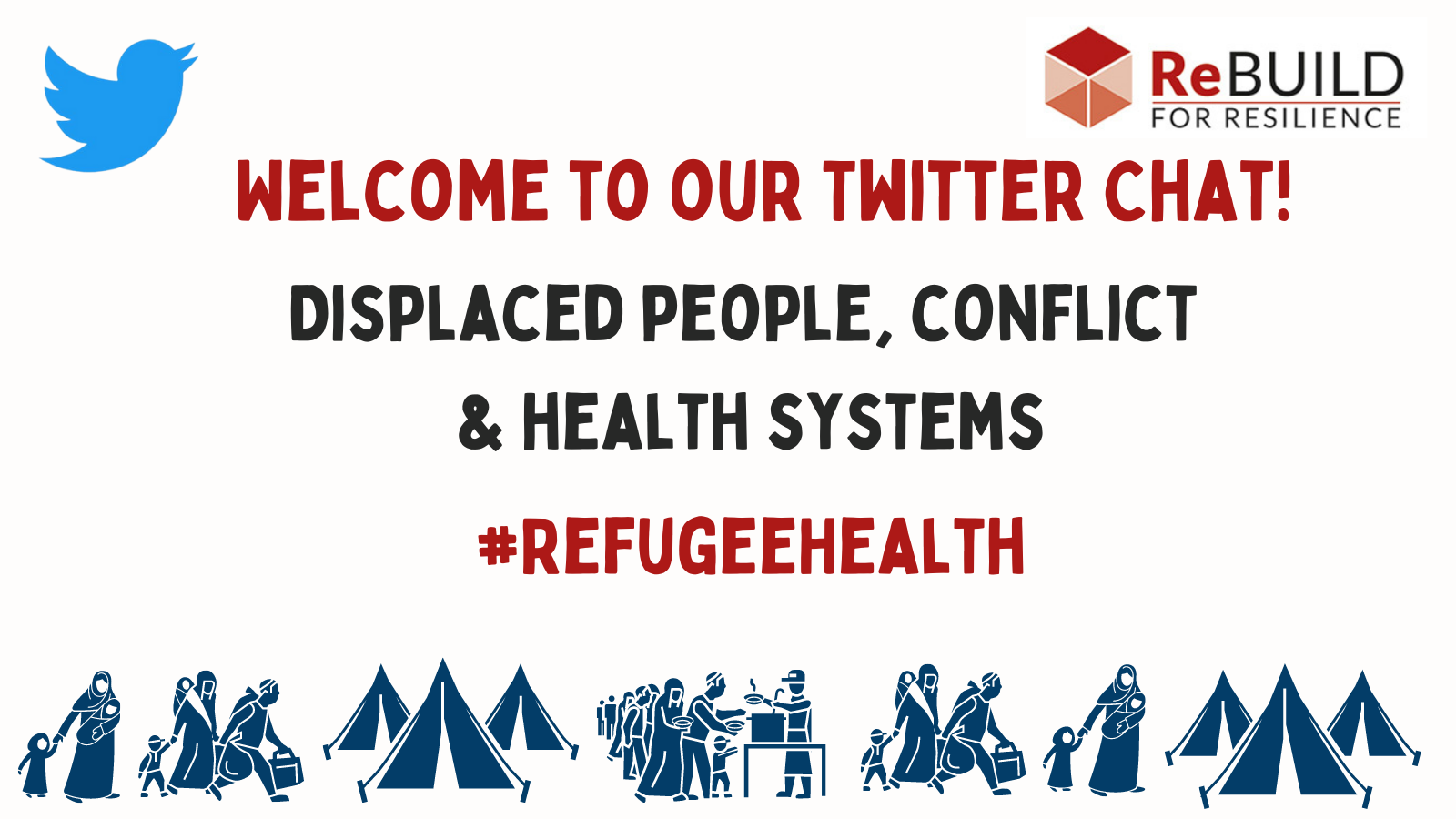
Twitter chat on displaced people, conflict & health systems
ReBUILD for Resilience ran a Twitter Chat in November 2021 on health systems, conflict and displaced people using the hashtag #RefugeeHealth. You can read Twitter Moments (collated tweets) of each question here [each link opens in a new Twitter tab]
Our panel of experts
Zuhrat Inam completed her Bachelors in Economics and Political Science from the University of Minnesota-Twin Cities and her Masters in International Development and Humanitarian Emergencies from the London School of Economics and Political Science. She has worked in the Rohingya refugee crisis as a researcher at BRAC James P Grant School of Public Health and is currently working with the International Rescue Committee as a Manager for the Strategic Action Plan, also in the Rohingya refugee crisis. She is enthusiastic about humanitarian and refugee health.
Fouad M Fouad is Associate Professor at the Faculty of Health Sciences, and Co-Director of Refugees Health Program at AUB. He leads the ReBUILD for Resilience team at the university. His current research interests focus on the health of forced displaced populations and refugees, as well as the impact of this crisis on their health and well-being. Fouad is Principal Investigator and Co-Investigator on several projects on health in protracted and armed conflicts. He served as a commissioner in two Lancet Commissions – the AUB-Lancet Commission on Syria and the crises in global governance, health and aid and the UCL-Lancet Commission on Migration and Health.
Amina Jama is a researcher and public health specialist who is the Co-Investigator leading the GCRF DISOCO research in Somalia. She is the founder and Director of the Women in Global Health Chapter in Somalia. Dr Jama is currently a Program Director with Save the Children International, Somalia Country Office. As a ‘pracademic’ engaged in both research and program implementation, she brings a unique skill set to her work, with a strong focus on the strategic program design and implementation of gender equity, health and displacement, and evidence-based programming in fragile and conflict contexts.
Sabina F Rashid is Dean and Professor at the BRAC School of Public Health, BRAC University. A medical anthropologist by training, she has more than 25 years’ experience in Bangladesh. Her areas of research and teaching interest and experience are ethnographic and qualitative research, with a focus on urban populations, adolescents, and marginalized groups. She is particularly interested in examining the impact of structural inequalities and inequities and intersectional factors that affect the ability of these populations to realize their health and rights.
Eric Weerts works for Humanity & Inclusion in the field of project coordination and training to set up of rehabilitation services. He is specialist in rehabilitation services in emergencies. He is based in Brussels (Belgium) and travels regularly to projects in Afghanistan, South East Asia and Africa for training and management support for the health workforce and ministries involved with rehabilitation and medical emergencies, including preparedness capacity in humanitarian contexts. This year he has been following closely the development of Humanity & Inclusions activities in Afghanistan responding to the context changes in the country and acting as Technical Unit Manager in support of physical and psychosocial rehabilitation projects run in four provinces in the country.
Mariam Dahir is a medical doctor who graduated from University of Hargeisa in Somaliland. Mariam has more than seven years’ experience in managing health projects in Somaliland; she was the first female program manager at the MOH-leading HIV program in 2012-13, led the medical education and health sector regulation in 2013-15, and in 2017-18 held a position in WHO Somalia as HIV data analyst. She is currently leading a primary health care intervention project (SHINE Supply in Awdal Region) to enhance maternal and child health, access to family planning, and sexual and reproductive health. She is a dedicated champion of ‘Health for all’, reaching out to marginalized/neglected groups such as people with HIV and mental illness, and advocates for quality of health care having developed a clinical audit project that checks and improves the quality of health care in Somaliland. During the COVID-19 pandemic she has supported and trained health workers in high risk settings in infection control precautions, physical distancing and managing the health care facility. She also leads on awareness raising and health education within the community through her platform #HealthTalks.